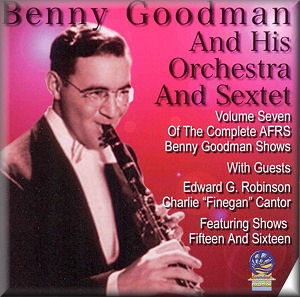Show Fifteen: 10th October, 1946. Guest: Edward G. Robinson
1. Introduction
2. After You've Gone
3. Comedy: Victor Borge and Don Wilson
4. Pity the Poor Lobster
5. St. Louis Blues
6. Comedy: Victor Borge and Edward G. Robinson
7. Prelude in C Sharp Minor
8. The Sheik of Araby
9. Comedy: Victor Borge and Edward G. Robinson
10. Closer: Goodbye
Show Sixteen: 16th October, 1946. Guest: Charlie "Finegan" Cantor
11. Introduction
12. King Porter Stomp
13. Comedy: Victor Borge and Don Wilson
14. If You Were the Only Girl in the World
15. Hora Staccato
16. Comedy: Victor Borge and Charlie Cantor
17. Warsaw Concerto
18. Honeysuckle Rose
19. Comedy: Victor Borge and Charlie Cantor
20. I Know That You Know
21. Closer: Goodbye
Personnel - Orchestra:
Benny Goodman - Clarinet
John Best, Nate Kazebier, Dick Mains, Dale Pierce - Trumpets
Leon Cox, Cutty Cutshall - Trombones
Addison Collins - French Horn
Larry Molinelli, Bill Shine - Alto saxes
Cliff Strickland, Zoot Sims - Tenor saxes
John Rotella - Bass sax
Joe Bushkin - Piano
Barney Kessel - Guitar
Harry Babasin - Bass
Louis Bellson - Drums
Johnny White - Vibes
Art Lund - Vocals
Personnel - Sextet:
Benny Goodman - Clarinet
Joe Bushkin - Piano
Harry Babasin - Bass
Barney Kessel - Guitar
Johnny White - Vibes
Louis Bellson - Drums
This CD is titled Benny Goodman and His Orchestra and Sextet, Volume Seven of the Complete AFRS Benny Goodman Shows. On the cover Benny Goodman and His Orchestra and Sextet is given emphasis by the large size of the font in the first part of the title and the repetition of his name in the second. Further emphasis is given by the picture of Goodman that takes up almost half of the front cover. However, all of that is misleading. A little less than half of the content is by the Goodman musical groups-some 28 minutes, the other 33 minutes being given to Borge's comedy and piano features. I suppose, given the title, that the intended audience is the Goodman one, but it is being given short shrift. Tracks 1, 2, 4, 10-15, 20 and 21 feature the Goodman band, while 5, 8 and 18 showcase the sextet. Of the band tracks, 1, 10, 11 and 21 are actually snippets since they are background for the MC, and 4 and 14 are backing for Lund's vocals.
One would expect that with names such as Cutty Cutshall, Zoot Sims, Joe Bushkin, Barney Kessel and Louis Bellson backing the leader, the music would be of high quality, as indeed it is. The first show, that of 10th October, 1946, begins with a cracking romp through After You've Gone. Following that is Pity the Poor Lobster, a simple but catchy tune with eminently forgettable lyrics that probably had Lund blushing while singing them. It is succeeded by the sextet's version of St. Louis Blues, an interesting arrangement with a pair of double-time choruses following the solos by Bushkin and White, leading to the coda. On The Sheik of Araby, the next musical selection, solos are passed around in the sextet's tight arrangement with its breaks, only Bellson and Babasin not being given one. It's interesting that with Babasin's presence, Bellson does not have to "pound the bass drum" … la Krupa but can just lay down the odd accent with it. The broadcast closes with a truncated version of Goodman's sign-off, Goodbye.
On the second broadcast, 16th October, 1946, a familiar Goodman piece is the opening number, King Porter Stomp, that cooks right through to the trading of two-bar riffs between the brass section and the reeds going into the coda. Lund then sings on the slow waltz If You Were the Only Girl in the World. Following that, Goodman solos on an arrangement of Hora Staccato, playing it "straight" almost all the way through until he swings a couple of choruses toward the end. The sextet's number in this broadcast is Honeysuckle Rose. Vintage small group it is, following arrangements of previous performances of this tune, and I almost expected Hampton's trademark grunts during White's solo. The last number is I Know That You Know, which Bellson and the rest of the rhythm section keep driving to a satisfying climax. The disc ends with the short version of Goodbye.
I haven't heard any of the volumes that precede this, the seventh, so I'm not sure if the "Goodman: other" ratio holds with them, too. While old-time radio buffs and perhaps cultural historians will probably appreciate having the entire broadcasts, for those interested only in Goodman's music the long spaces between the musical tracks seem even longer, given the quality of the humour. Judging by their response, the audience back then found it riotously funny; I found it very "corny". And Edward G. Robinson as a comedian? Please. Goodman aficionados would have been better served by omitting all the "comedy" and leaving just the musical portions-perhaps from four shows per CD. As it is, the disc will appeal mainly to Goodman completists, and they will have to be ready to do quite a bit of fast forwarding.
Bert Thompson
